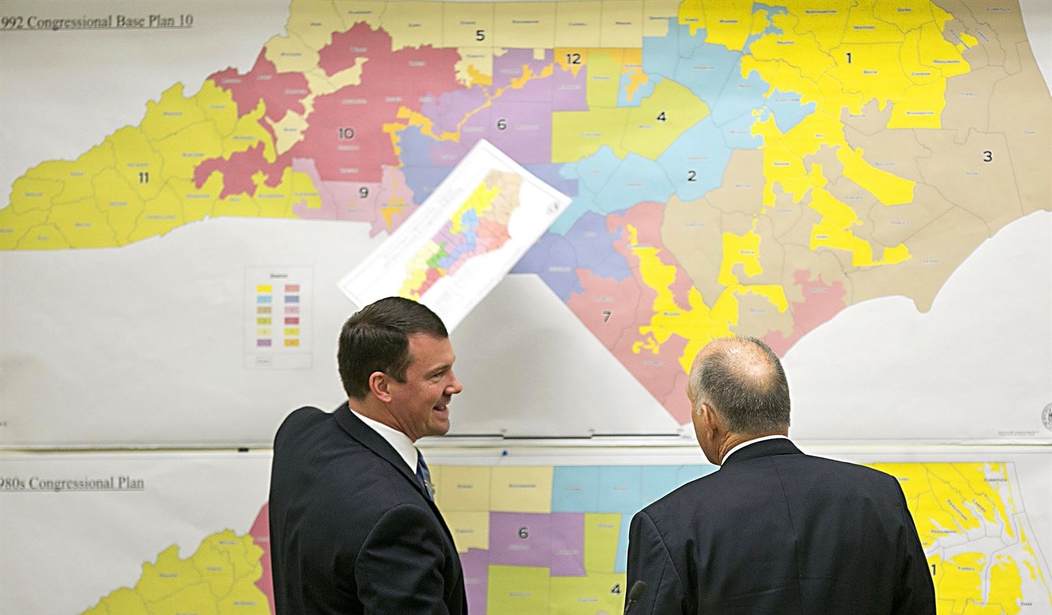Here's a suggestion for those who think that partisan redistricting -- or, as is often the case with these plaints, partisan redistricting by Republicans -- threatens to destroy American democracy. Take a look at "The Long Red Thread," the recent history by Sabato's Crystal Ball analyst Kyle Kondik of House of Representatives elections from 1964 to the present decade.
Kondik shows how partisan redistricting, from the aftermath of the Supreme Court's one-person-one-vote decision in 1964 up throughout the 1980s, was employed to great effect by Democratic redistricters -- and to considerable applause and great delight of the few journalists who were paying any attention.
I'm familiar with this history as the principal co-author of "The Almanac of American Politics" since 1972, and from social conversations with the most adept and influential of Democratic redistricters, California Rep. Phillip Burton (whose San Francisco seat is now represented by Nancy Pelosi).
Those days are gone, or at least banished from the memory of most political scientists and journalists. Redistricting is depicted as a weapon wielded almost entirely by crafty Republicans, bent on denying the righteous will of the people.
The reality is that politics today, as in the years from 1964 to 1994, inevitably plays a role in setting the boundaries of congressional and legislative districts. But the one-person-one-vote sets limits on the gains parties can make, and that partisan redistricting, or, to use the term invented back in 1812, referring to our fifth vice president, gerrymandering, often boomerangs.
Recommended
In this cycle, Republicans have a reduced putative advantage in redistricting because they control legislatures and governorships in states with 187 districts, while Democrats do so in states with 75. But states with 173 districts have supposedly nonpartisan districting commissions or divided political control, and six states have just one congressional district.
The clear trend in the 19 states with 161 districts that have districted so far is to strengthen party incumbents. Cook Political Report redistricting ace David Wasserman reports that in states with completed plans, the number of districts that former President Donald Trump carried by five points or more is up from 88 to 100, and the number of districts that President Joe Biden won by such margins is up from 60 to 65.
Illinois Democrats, with their early filing deadline, led off with a hyperpartisan plan that extended "bacon strip" districts from Chicago wards far out into the prairie. Republicans in other states have retaliated, as they did 10 years ago, with partisan plans of their own.
Some heavily Democratic states have yet to act. Maryland Democrats, having zeroed out one of the state's two Republicans 10 years ago, are poised to endanger the other this year. In New York, the Democratic legislature seems bent on bypassing a commission and imposing a plan to cut Republicans from eight seats to three.
California's commission has released some preliminary maps in a state that will lose a House seat for the first time in history. In Michigan and Arizona, there's controversy suggesting that independent commissions and their staff may not be as nonpartisan and impartial as they've been billed.
That stands to reason. Anyone interested enough in this stuff to be able to work out redistricting plans without years of tutelage can't help knowing the likely partisan effect of splitting a county horizontally or vertically.
But even the most politically adept redistricter doesn't know what lies ahead in the future. No one knew 10 years ago that Trump would make Republicans anathema to many white college graduates even while making them more acceptable to folks in rural areas. So, both parties lost supposedly safe seats in 2016, 2018 and 2020.
Democratic redistricters were able to help the party maintain House majorities as Republicans held the White House for 20 of 24 years from 1968 to 1992. But also Democrats, as the opposition party, then could adapt to local terrain and attack Republicans on locally unpopular administration policies. But starting in the 1990s, control of the White House has alternated, and neither party has held onto House majorities for the whole 10 years of a redistricting cycle.
Currently, Democratic voters' overconcentration in urban centers and university towns gives Republicans a structural advantage in one-person-one-vote redistricting, and their Trump-era gains among Hispanics help in Texas and Florida.
These factors, plus the sense that under the Biden Democrats, things (the border, inflation, crime, COVID-19) are spinning out of control, give Republicans an excellent chance of overturning Democrats' 222 to 213 majority in 2022. But redistricting can't lock in those advantages through 2030.

























Join the conversation as a VIP Member